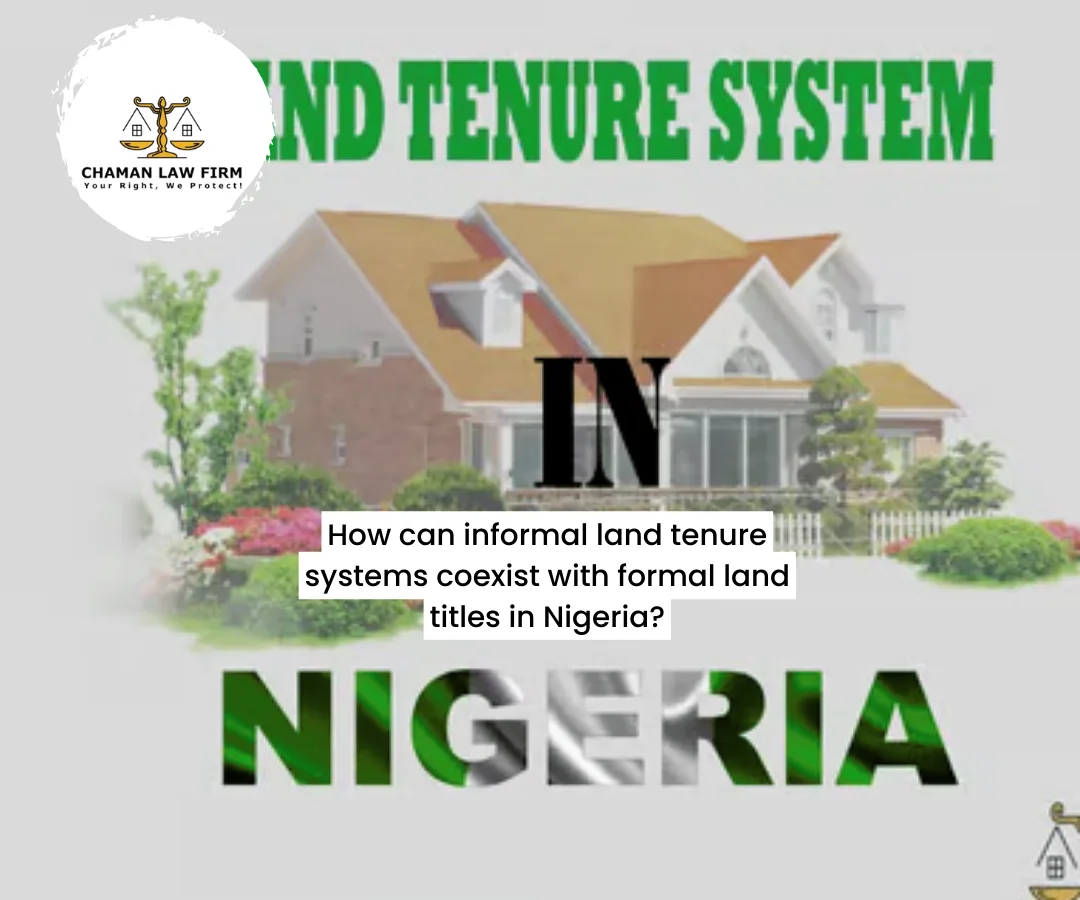How Can Informal Land Tenure with Formal Land Titles in Nigeria?
Introduction
Land tenure in Nigeria is characterized by a dual system, where informal land ownership coexists with formal land administration. While formal land titles provide legal security, informal land tenure remains widespread, especially in rural and peri-urban areas. Many Nigerians rely on customary land tenure, family inheritance, or community allocations without legal documentation.
This article explores how informal land tenure can be integrated into the formal land title system to enhance security, reduce land disputes, and promote sustainable land development.
1. Understanding Land Tenure Systems in Nigeria
A. What is Informal Land Tenure?
Informal land tenure refers to unregistered land ownership practices, often based on customary, traditional, or oral agreements. Features include:
Community-controlled land allocation
Family inheritance without formal documentation
Unregistered land transactions
Absence of government-recognized ownership records
B. What is Formal Land Tenure?
Formal land tenure follows legal procedures and government-recognized documentation. Features include:
Certificate of Occupancy (C of O) issued by state governments.
Governor’s Consent for land transfers.
Registered Deeds in land registries.
Surveyed land records.
C. Why Integration is Necessary
Land security: Informal landowners lack legal protection against eviction.
Access to financial services: Banks require formal land titles as collateral for loans.
Reduced land disputes: Proper documentation minimizes multiple claims.
Urban planning & infrastructure development: Formalization supports government planning and investments.
2. Challenges of Informal Land Tenure in Nigeria
A. Legal and Policy Barriers
The Land Use Act of 1978 vests land ownership in state governors, making land formalization bureaucratic and slow.
Customary land tenure is not fully recognized in Nigeria’s legal framework.
B. Cost of Land Registration
High fees for land surveys, registration, and processing discourage landowners from seeking formal titles.
Informal landholders lack financial resources to cover government charges.
C. Bureaucratic Inefficiencies
Lengthy and complex land registration processes cause delays and frustration.
Corruption in land agencies discourages compliance.
D. Resistance from Traditional Authorities
Chiefs and family heads fear losing control over communal lands.
Some traditional rulers prefer informal systems due to their flexibility.
E. Land Disputes and Multiple Ownership Claims
Lack of documentation leads to overlapping claims and conflicts.
Oral agreements make proving ownership difficult in legal disputes.
3. Strategies for Integrating Informal Land Tenure into Formal Land Titles
A. Land Regularization Programs
Governments should establish simplified land regularization programs to legalize informal land holdings.
Offer mass land registration drives at subsidized rates.
B. Customary Land Documentation
Recognize customary land titles and provide Customary Land Certificates (CLCs).
Encourage digital documentation of community land ownership records.
C. Affordable Land Registration Fees
Reduce costly administrative charges for land titling.
Implement payment plans for low-income landowners.
D. Decentralized Land Administration
Establish local land registration offices in rural areas.
Reduce reliance on state capital offices for documentation.
E. Strengthening Traditional Land Governance
Integrate traditional rulers into land formalization policies.
Allow chiefs to collaborate with land registries for smooth title conversion.
F. Alternative Dispute Resolution (ADR) for Land Conflicts
Create community mediation centers for resolving land disputes.
Strengthen customary courts for land-related cases.
G. Public Awareness and Legal Education
Conduct sensitization campaigns on the benefits of formalizing land tenure.
Provide free legal aid to assist landowners in registration processes.
4. Case Studies of Successful Land Tenure Integration
A. Ghana’s Customary Land Secretariats
Established Customary Land Secretariats (CLSs) to document and register communal land ownership.
Reduced land disputes and improved land governance.
B. Rwanda’s Land Tenure Regularization Program
Used digital mapping to register customary landowners.
Achieved 95% success rate in formalizing informal land holdings.
C. Nigeria’s Ogun State Land Bureau
Created community-based land registration initiatives.
Integrated customary land into formal land administration.
5. Recommendations for Policy Reform
A. Amend the Land Use Act
Introduce legal recognition of customary land ownership.
Allow easier conversion of informal land tenure into formal titles.
B. Improve Land Administration Processes
Introduce electronic land registration systems to reduce fraud.
Simplify and automate land titling procedures.
C. Strengthen Public-Private Partnerships
Encourage collaboration between private sector and government for land titling.
Support banks to accept customary land certificates as collateral.
D. Encourage Community Participation
Engage local communities in land formalization programs.
Ensure policies reflect cultural realities and local needs.
6. Conclusion
Integrating informal land tenure with formal land titles in Nigeria is essential for socioeconomic development, land security, and investment growth. By simplifying land registration, recognizing customary ownership, and reducing bureaucratic hurdles, the government can create an inclusive land administration system.
Contact Us
Millions of Nigerians rely on informal land tenure systems, but without formal land titles, they face challenges in ownership security, land transactions, and investment opportunities. Integrating informal land tenure with formal land systems is crucial for economic growth, legal protection, and reduced land disputes.
At Chaman Law Firm, we provide expert legal guidance to help landowners navigate the complexities of:
✔️ Customary land ownership formalization
✔️ Land registration and title conversion
✔️ Dispute resolution and legal documentation
✔️ Government approvals and policy compliance
📞Phone: 08065553671, 08096888818
✉ Email: chamanlawfirm@gmail.com
📍 Address: 115, Obafemi Awolowo Way, Allen Junction, Ikeja, Lagos, Nigeria
🌍Click here to learn more about Chaman Law Firm
Take control of your land rights—let us help you bridge the gap between informal and formal land ownership today! ✅


